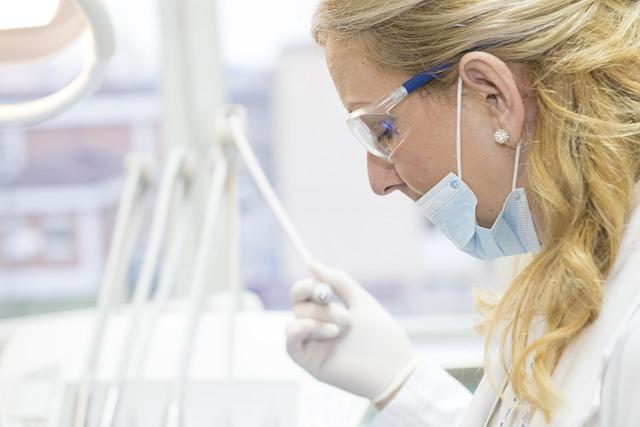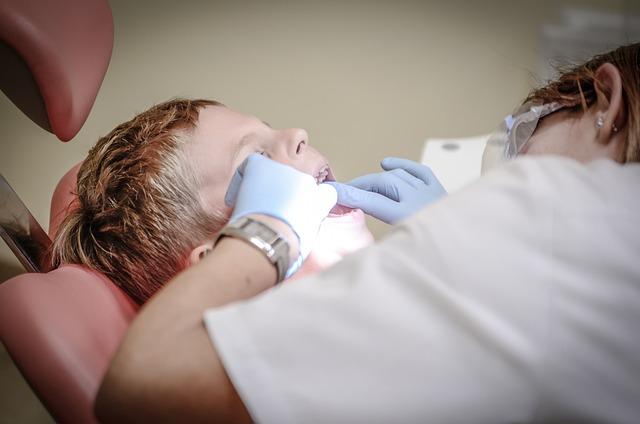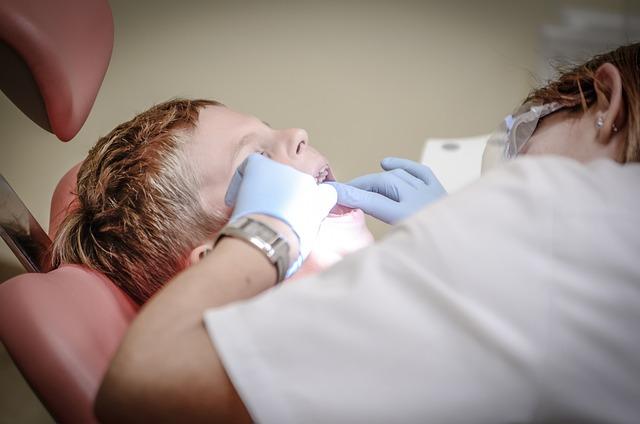Does Salt Make Your Teeth Yellow? Dental Effects Explored
Salt is an indispensable ingredient that has been enhancing the flavors of our favorite dishes since time immemorial. However, have you ever wondered if this ubiquitous seasoning could be secretly staining your pearly whites? With its crystalline allure and slightly abrasive texture, salt has long been a subject of curiosity when it comes to dental health. Today, we embark on a journey to uncover the truth: does salt make your teeth yellow? Exploring the dental effects of this beloved mineral, we aim to provide you with a confident, knowledgeable, and neutral understanding of the matter at hand. So, let’s dive in and separate dental fact from fiction, leaving no grain unturned.
1. Unveiling the Truth: Does Salt Really Make Your Teeth Yellow?
Many people are concerned about the impact of salt on their dental health. One common belief is that salt can make your teeth yellow. However, it’s important to separate fact from fiction when it comes to this topic.
1. The Role of Salt: Salt itself does not directly cause teeth to turn yellow. In fact, salt is a mineral that is naturally present in our bodies and plays a crucial role in maintaining overall health. When consumed in moderation, salt does not pose a significant risk to dental aesthetics.
2. The Real Culprit: Yellowing of teeth is primarily caused by external factors such as poor oral hygiene, smoking, and consuming certain foods and beverages like coffee, tea, and red wine. These substances contain pigments that can stain the enamel, the outer layer of the teeth, leading to a yellow appearance.
3. Maintaining Dental Health: While salt may not directly cause yellow teeth, it’s important to maintain good oral hygiene to prevent staining and maintain overall dental health. Brushing your teeth twice a day, flossing daily, and visiting your dentist regularly are essential habits to keep your teeth looking their best.
Overall, the idea that salt makes your teeth yellow is a misconception. It’s crucial to focus on maintaining good oral hygiene and making healthy lifestyle choices to ensure a bright and confident smile.

2. Understanding the Dental Implications of Salt Consumption
Salt consumption can have various implications for dental health. It is important to understand the potential effects it may have on our teeth and gums. Here are some key points to consider:
- Enamel erosion: Excessive salt intake can contribute to the erosion of tooth enamel, the protective outer layer of our teeth. This erosion can lead to increased tooth sensitivity, discoloration, and a higher risk of cavities.
- Gum inflammation: Consuming too much salt can also contribute to gum inflammation, which can lead to gingivitis and, if left untreated, periodontitis. These conditions can cause gum recession, bone loss, and even tooth loss.
- Saliva production: Salt can affect the production of saliva in our mouths. Saliva plays a crucial role in maintaining oral health by neutralizing acids, washing away food particles, and providing minerals to strengthen tooth enamel. Imbalances in saliva production due to excessive salt intake can disrupt these natural processes.
To maintain good dental health, it is essential to consume salt in moderation and practice proper oral hygiene habits. Regular brushing, flossing, and routine visits to the dentist can help mitigate the potential dental implications associated with excessive salt consumption.
3. Breaking Down the Science: The Link Between Salt and Teeth Discoloration
When it comes to teeth discoloration, it’s important to understand the role that salt plays in this common dental issue. While many people associate teeth discoloration with coffee, tea, or tobacco, salt can also have a significant impact on the color of your teeth.
So, how does salt contribute to teeth discoloration? Here are a few key points to consider:
- Acidic erosion: Salt can increase the acidity in your mouth, leading to the erosion of tooth enamel. As the protective outer layer of your teeth wears away, the underlying dentin, which is naturally yellowish, becomes more visible.
- Staining agents: Certain types of salt, particularly those with added colorings or impurities, can contain staining agents that adhere to the tooth surface. Over time, these agents can cause your teeth to appear discolored.
- Dehydration: Salty foods and drinks can dehydrate your body, including your mouth. When your mouth lacks sufficient moisture, it can lead to a buildup of plaque and bacteria, which can contribute to teeth discoloration.
While salt can indeed have an impact on teeth discoloration, it’s important to note that moderation is key. Avoid excessive consumption of salty foods and drinks, maintain good oral hygiene practices such as regular brushing and flossing, and consider using a fluoride toothpaste to help protect your teeth from the effects of salt and other potential staining agents.
4. Debunking the Myth: Separating Fact from Fiction about Salt and Yellow Teeth
There is a common myth that consuming salt leads to yellow teeth. However, it’s important to debunk this misconception and separate fact from fiction. Here are the key points to consider:
- Staining is caused by other factors: Yellow teeth are primarily caused by external factors such as poor oral hygiene, smoking, and consuming certain foods and beverages like coffee or red wine. Salt consumption alone does not directly contribute to tooth discoloration.
- Minimal impact on tooth enamel: Salt is a mineral compound that does not contain any pigments or dyes that can stain teeth. Moreover, when consumed in moderation, salt doesn’t erode tooth enamel significantly.
- Oral hygiene is crucial: Maintaining proper oral hygiene practices, such as regular brushing, flossing, and dental check-ups, is the most effective way to prevent tooth discoloration. It is more important to focus on these habits rather than blaming salt for yellow teeth.
By understanding the facts, we can dispel the myth surrounding salt and yellow teeth. While it’s always important to consume salt in moderation for overall health, it is not a direct cause of tooth discoloration. Prioritizing good oral hygiene habits is key to maintaining a bright, healthy smile.
5. The Role of Salts in Dental Health: Examining the Effects on Tooth Enamel
In this section, we will delve into the role of salts in dental health and examine their effects on tooth enamel. Salts play a crucial role in maintaining good oral health, but it is important to understand how they can impact our teeth.
1. Salts and tooth enamel: Salts, such as sodium and calcium, are essential for the health and development of tooth enamel. They help to strengthen the enamel, making it more resistant to decay and erosion. However, an excessive intake of salts can have negative effects on tooth enamel, leading to enamel erosion and increased vulnerability to dental problems.
2. Salts and pH balance: Salts can affect the pH balance in our mouths, which plays a crucial role in dental health. When the pH level in our mouth becomes too acidic, it can lead to demineralization of tooth enamel. Salts can help maintain a balanced pH level, preventing acid attacks on the enamel and promoting a healthy oral environment.
3. The importance of moderation: While salts are necessary for dental health, it is important to consume them in moderation. Excessive intake of salts, especially through processed and sugary foods, can contribute to tooth decay and other oral health issues. It is recommended to follow a balanced diet, limit the consumption of processed foods, and maintain good oral hygiene practices to ensure the optimal health of tooth enamel.
6. Exploring the Mechanisms: How Salt Can Impact the Color of Your Teeth
When it comes to the color of your teeth, salt can have a surprising impact. Understanding the mechanisms behind this phenomenon can help you maintain a brighter smile. Here are a few ways in which salt can influence the color of your teeth:
- Staining: Consuming foods or beverages high in salt can lead to staining of the teeth. This occurs when pigmented molecules from these substances adhere to the enamel, causing discoloration over time.
- Saliva Production: Salt has the ability to stimulate saliva production, which plays a crucial role in maintaining oral health. Saliva helps wash away food particles and bacteria that can contribute to tooth discoloration.
- Enamel Erosion: Excessive salt consumption can contribute to enamel erosion, which can make the underlying dentin more visible. Dentin has a naturally yellowish color, so when it becomes more exposed, teeth may appear darker or yellower.
It’s important to note that while salt can impact the color of your teeth, it is just one factor among many. Proper oral hygiene, regular dental check-ups, and a balanced diet are key to maintaining a healthy and vibrant smile.
7. Salt and Stains: Examining the Relationship Between Sodium and Tooth Discoloration
Sodium is a common ingredient found in various foods and beverages, but have you ever wondered about its impact on tooth discoloration? In this section, we will delve into the relationship between sodium and stains on teeth, providing you with valuable insights into this intriguing topic.
1. **What causes tooth discoloration?** Tooth discoloration can be caused by various factors, including the consumption of certain foods and drinks. Sodium, when consumed in excessive amounts, can lead to tooth stains. This is because sodium can weaken the tooth enamel, making it more susceptible to staining agents present in food and beverages.
2. **How does sodium contribute to tooth stains?** Sodium is known to increase saliva production, which can help wash away food particles and plaque from the teeth. However, excessive sodium intake can also dehydrate the mouth, reducing the flow of saliva. This can result in the buildup of bacteria and plaque, leading to tooth discoloration over time.
3. **Preventing and reducing tooth stains caused by sodium:** While it may be challenging to completely eliminate sodium from your diet, there are steps you can take to minimize its impact on tooth discoloration. Here are some tips:
- Limit your intake of sodium-rich foods and drinks
- Drink plenty of water to maintain saliva flow
- Practice good oral hygiene, including brushing and flossing regularly
- Consider using a toothpaste specifically designed to remove stains
By understanding the relationship between sodium and tooth discoloration, you can make informed choices about your dietary habits and oral care routine to maintain a healthy and vibrant smile.
8. Dental Experts Weigh In: What Do Professionals Say about Salt and Yellow Teeth?
Dental experts have extensively studied the relationship between salt consumption and yellow teeth, providing valuable insights for patients concerned about their dental health. Here’s what professionals have to say:
1. Salt as a culprit: Many dental professionals agree that excessive consumption of salt can contribute to the development of yellow teeth. This is because salt is abrasive and can wear away the protective enamel layer on teeth, making them appear more yellow over time. Additionally, high salt intake can lead to dehydration, reducing saliva production, which is essential for maintaining a healthy pH balance in the mouth.
2. Importance of moderation: While salt can have negative effects on tooth color, dental experts emphasize that moderation is key. It’s important to maintain a balanced diet and limit salt intake to the recommended daily allowance. By doing so, individuals can significantly reduce the risk of yellowing teeth and maintain overall oral health.
3. Prevention and treatment: Dental professionals recommend several preventive measures and treatment options to counteract the effects of salt on tooth discoloration. These include regular brushing and flossing, using fluoride toothpaste, consuming foods rich in calcium and vitamin D, and visiting the dentist regularly for professional cleanings and check-ups. In cases where yellowing is already present, professional teeth whitening treatments can effectively restore a brighter, more vibrant smile.
9. Maintaining a Bright Smile: Tips to Minimize Salt-Related Tooth Discoloration
When it comes to maintaining a bright smile, it’s important to be aware of factors that can contribute to tooth discoloration, including consuming excessive amounts of salt. While salt is a common ingredient in many foods, it can have negative effects on the color of your teeth. However, there are several simple tips you can follow to minimize salt-related tooth discoloration:
- Drink plenty of water: Staying hydrated helps flush out toxins and reduces the impact of salt on your teeth. Aim to drink at least 8 glasses of water per day.
- Limit salty snacks: Try to minimize your intake of salty foods such as chips, pretzels, and processed snacks. Opt for healthier alternatives like fruits and vegetables instead.
- Practice good oral hygiene: Brush your teeth at least twice a day using a fluoride toothpaste and floss daily. This helps remove surface stains and prevents the buildup of plaque, which can intensify tooth discoloration.
- Consider professional teeth whitening: If salt-related tooth discoloration persists or becomes more noticeable, consult with your dentist about professional teeth whitening options. They can provide personalized advice and treatments to restore the brightness of your smile.
By following these tips, you can minimize the impact of salt on your teeth and maintain a bright, healthy smile. Remember, a little effort can go a long way in preserving your dental aesthetics.
10. The Final Verdict: Understanding the Complexities of Salt’s Impact on Dental Aesthetics
The impact of salt on dental aesthetics is a subject that requires a comprehensive understanding of various factors. Salt, in its natural form, can be abrasive and have detrimental effects on tooth enamel if not used properly. However, it is important to note that salt can also have positive effects on dental health when used in moderation and with proper oral hygiene practices.
Here are some key points to consider when evaluating the complexities of salt’s impact on dental aesthetics:
- Abrasive nature: Salt, when used in excessive amounts or with excessive force, can lead to enamel erosion and tooth sensitivity. It is crucial to be mindful of the abrasive nature of salt and use it in moderation.
- Anti-bacterial properties: Salt has natural anti-bacterial properties that can help combat oral bacteria and reduce the risk of cavities and gum disease. Incorporating salt into oral care routines, such as saltwater rinses, can be beneficial for maintaining oral health.
- Balance and moderation: Like most things in life, balance and moderation are key when it comes to salt’s impact on dental aesthetics. Using salt in moderation and in combination with other oral hygiene practices, such as regular brushing and flossing, can help maintain a healthy smile.
Understanding the complexities of salt’s impact on dental aesthetics is essential for making informed decisions about oral care practices. It is advisable to consult with a dental professional for personalized guidance on incorporating salt into your oral hygiene routine.
Frequently Asked Questions
Q: Does salt make your teeth yellow?
A: No, salt does not directly cause yellowing of the teeth.
Q: What are the dental effects of salt on our teeth?
A: Salt itself does not have any significant dental effects.
Q: Can consuming too much salt harm our teeth?
A: Consuming excessive amounts of salt can indirectly harm your teeth by increasing the risk of certain dental conditions.
Q: How does excessive salt intake affect our dental health?
A: High salt intake can lead to dehydration, which reduces saliva production. This can increase the risk of tooth decay and gum disease.
Q: Are there any other ways salt can impact our dental health?
A: Saltwater rinses can help alleviate gum inflammation and promote healing after dental procedures. However, it is important to note that rinsing with saltwater should not replace regular dental hygiene practices.
Q: Is it recommended to reduce salt intake for better dental health?
A: It is advisable to maintain a balanced diet and limit excessive salt intake for overall good health, which indirectly contributes to better dental health.
Q: What other factors can cause yellowing of the teeth?
A: Various factors, such as poor oral hygiene, smoking, certain medications, aging, and consuming heavily pigmented foods and beverages, can contribute to tooth discoloration.
Q: How can we prevent yellowing of the teeth?
A: Practicing good oral hygiene, avoiding tobacco products, limiting consumption of stain-causing food and drinks, and regular dental check-ups can help prevent yellowing of the teeth.
Q: What are some effective teeth whitening techniques?
A: Teeth whitening techniques, such as professional dental treatments or over-the-counter whitening products, can help remove stains and brighten the teeth. However, it is important to consult with a dentist before using any whitening products to ensure safety and effectiveness.
Q: Is it possible to reverse yellowing of the teeth caused by external factors?
A: Yes, in many cases, yellowing of the teeth caused by external factors can be reversed or significantly improved through professional teeth whitening treatments or other appropriate dental procedures.
Concluding Remarks
In conclusion, after exploring the dental effects of salt on our teeth, it is evident that salt itself does not directly cause yellowing. While it does have abrasive properties, it is the combination of salt with other substances like acids and pigmented compounds that may lead to tooth discoloration over time. However, maintaining good oral hygiene practices such as regular brushing, flossing, and professional cleanings can help prevent and minimize any potential staining caused by salt or other dietary factors. Remember, moderation is key when it comes to salt consumption, and a balanced diet along with proper dental care will ensure a bright and healthy smile. So, enjoy your favorite salty snacks in moderation and don’t forget to take care of your teeth for a lasting white smile.






